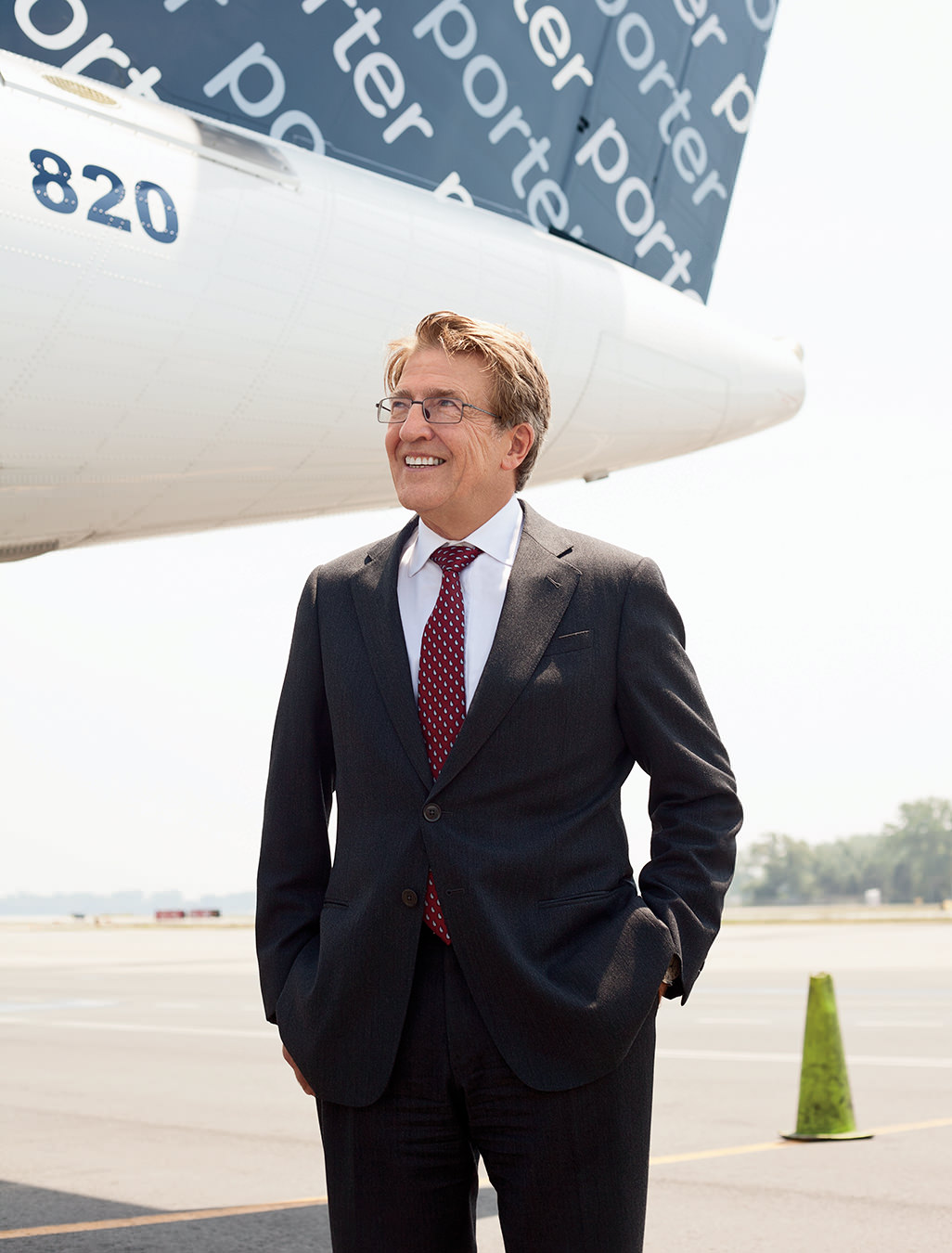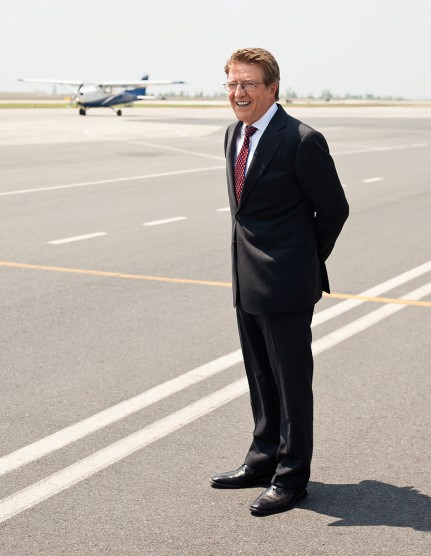Robert Deluce of Porter Airlines
Flight plan.

The scene: the Porter Airlines departure lounge at Billy Bishop Toronto City Airport on a stifling hot summer day. Inside, everything is cool and relaxed. The lounge is swank: bright, clean, and well organized with a row of workstations, each with its own Apple iMac desktop computer, a seating area with low-slung loveseats and armchairs, and a complimentary food and beverage bar.
An elderly woman stares at the automatic coffee dispenser, perplexed by the machine’s array of buttons and options. Turning to her right, she spots the exception that proves the rule—a gentleman in a well-tailored, two-piece grey suit, and a security badge around his neck. Naturally, she assumes that he works at the airport, and asks for some assistance. She has no idea that this man is Robert Deluce, president and CEO of Porter Airlines.
Rather than direct her toward one of his many employees working in the immediate vicinity, Deluce steps up and helps his passenger get a cup of coffee. A small and inconsequential part of this executive’s day? Perhaps—but it would be difficult to picture airline executive Richard Branson bothering to stop and help one of his passengers in such a way, let alone failed airline executive Donald Trump.
The truth of the matter is the world of consumer aviation is a no-quarter-asked-no-quarter-given business littered with sky-high egos and grounded ventures. So after a lifetime spent in this unforgiving business, what drives Robert Deluce to want to continue? The simple answer: he loves to fly.
His father served as a fighter pilot in the Second World War, and in 1951, Deluce’s parents began White River Air Services, a hunting and fishing charter airline based out of White River, a small town in Ontario which is halfway between Sault Ste. Marie and Thunder Bay. “I’m one of nine siblings, and pretty much all of us were involved in the family business at one point or another,” he explains. “It does get into your blood; there’s no question about it.”
Deluce himself worked as a commercial pilot for the airline. “There was a time, around when I was attending McGill University, where I thought briefly about going into medicine,” he says. “But I decided that wasn’t what I wanted to do and I’ve been in the airline industry ever since.”
The family acquired a number of airlines over the years, including Austin Airways in 1974, into which they merged White River Air Services. Their next big acquisition was Air Ontario in 1982, and, collectively, the airlines reached their peak in the mid-1980s as the largest regional airline in Canada, flying as far afield as Baffin Island and Greenland. Amid this success, the Deluce family amalgamated the two into Air Ontario in 1987 and sold to Air Canada—75 per cent in 1987, the remainder in 1993.
During the late eighties, the family had shifted their interest to another venture, Canada 3000, which launched in 1988. Under the guidance of Deluce, this charter airline became one of the largest of its kind in the world, serving over 90 destinations. His tenure concluded in 1995; the airline lasted just six years more before becoming permanently derailed in the aftermath of September 11, 2001.
Not one to sit still for long, Deluce turned his attention to another hub: Billy Bishop, the facility formerly known as Toronto City Centre Airport. The island airport, just a 121-metre ferry ride from downtown, was a sleepy place. In the early 1990s, the airport was losing $1-million each year and commuter airline City Express was struggling to stay in the air on a limited flight schedule. After City Express ceased operation, traffic through the airport dwindled to a low of about 20,000 passengers per year as Air Canada moved more flights over to Toronto Pearson International Airport, its main Canadian hub.
After a lifetime spent in this unforgiving business, what drives Robert Deluce to want to continue? The simple answer: he loves to fly.
“I did learn to fly here [Billy Bishop] as a high school student, so I had familiarity with the airport,” Deluce says. “And several of the subsequent companies I was involved with, including the family business, [landed there] from time to time.” This familiarity led to the belief that the facility was, in Deluce’s words, an “underdeveloped transportation jewel.”
Thus began the germ of an idea that would go on to become Porter Airlines.
By 2003, Deluce and his partners had become serious about the idea of a regional airline based in the city. They started to work with the Toronto Port Authority (TPA), operators of the airport, to develop better access to the island. A pedestrian bridge was approved, and the construction contract was signed. Then David Miller was elected mayor of Toronto.
“We always felt that an urban airport could be very compatible with a revitalized waterfront,” Deluce offers, diplomatically. But the new mayor claimed that the island airport was incompatible with the revitalization plans and cancelled the bridge project soon after taking office. In response, Deluce sued the City of Toronto for $505-million. The issue was resolved with the federal government paying some $35-million to the TPA. The pedestrian bridge never came to be.
The island airport has been a contentious issue for the city, one that stretches back to 1929, the year the idea was first conceived. It took a long time for the wings of progress to kick into high gear; the first plane didn’t land on the island until 1939. Since 1978, complaints about noise, air pollution, and vehicle traffic congestion have increased, which threw the establishment of Porter Airlines into doubt and threatened to impede further development at the airport. The bridge imbroglio provides some sense of the many challenges the island airport and its businesses have faced over the years—and how committed Deluce is when he has a plan.
In 2005, Deluce’s holding company, Porter Aviation Holdings (operating as Regco Holdings), bought City Centre Aviation, the company that owned Billy Bishop’s airport terminal. At that time, the terminal was only being used by Air Canada Jazz and on January 31, 2006, Air Canada’s month-to-month lease was terminated by City Centre Aviation. Two days later, Deluce announced the launch of Porter Airlines. This shrewd tactic gave Porter an effective monopoly at the airport—a move that triggered a dizzying array of lawsuits and countersuits.
The battle has become increasingly personal. In July 2010, Deluce decided to sue Air Canada in a matter that is, on the surface of it, completely unrelated to the legal entanglements with Porter. This issue dates back to the aforementioned sale of Air Ontario to Air Canada.
At the time of the deal, Air Canada promised Deluce and his wife, Catherine, free first-class travel passes for life. This part of the arrangement was honoured until the fall of 2009 when, with little advance warning, the Deluces found themselves cut off just as they were preparing to depart for a Caribbean vacation. Cue another lawsuit, this one seeking damages of $5-million, plus legal costs.
This year, Porter’s monopoly came to an end as Air Canada returned to the island. (Since May 2011, the Air Canada Express commuter service has been flying out of Billy Bishop with 15 flights daily to Montreal.) Even with the return of one of his chief opponents Deluce does not fear for the future. “We suspect that Air Canada is accomplishing something we may not have been able to do on our own: they’re attracting certain passengers who probably have never flown from Toronto City Airport,” he says. “These first-time passengers will like it well enough to want to fly to the other 15 or so destinations that Air Canada does not fly to [from Billy Bishop], so we think it’s a win-win.”
There’s also evidence to suggest that although the war between these two airlines isn’t close to being decided, the balance of power has shifted. The first month that both airlines were in direct competition, Deluce’s enterprise saw a 10.5 per cent increase in their year-over-year passenger load factor over May 2010. A month later saw a 12.4 per cent increase.
“Air Canada only ever became interested in the Toronto island airport when someone else showed interest,” Deluce says. “After City Express ceased operating in the early nineties, Air Canada really did consolidate their operations at Pearson, and they grew the [island airport] traffic all the way down to about 20,000 passengers per year.” They grew the traffic down—an interesting word used by a man who chooses them carefully.
This past July, the TPA and the City of Toronto reached an agreement to construct a $38-million pedestrian tunnel that is to run from the foot of Bathurst Street to the island airport and should be completed sometime in 2013. Although there were, and will likely continue to be, those who oppose the proposal, the tunnel will reduce reliance on the ferry system that currently shuttles passengers to and from the island.
In describing why he thinks a bustling island airport is good for Toronto, Deluce cites the example of Vancouver and its harbour filled with ferry boats and float planes. “It’s part of what makes that environment out there vital, and adds to the excitement. In the case of Toronto, I think we’ve been able to demonstrate that the airport and Porter are very much an important part of the waterfront growing and developing.”
Today, the island airport is busier than ever. Porter now flies 24 Canadian-built Bombardier Aerospace Q400 airplanes to 12 destinations in Canada and to four in the United States, including New York and Chicago. Airport traffic, meanwhile, has ballooned to between 1.2 and 1.5 million passengers a year.
Despite his record of success in a notoriously difficult industry, Deluce still has his detractors. Last year, for example, he cancelled plans for an IPO of Porter Airlines stock, citing unfavourable market conditions. This move spurred a series of questions regarding financial transparency and the health of the airline itself.
Yet for all the obstacles Deluce has encountered over the years, one thing is absolutely certain: he remains unreservedly optimistic about the future of Porter Airlines—and this attitude has been adopted by his employees.
It’s a challenge to track down anyone who doesn’t rave about the Porter passenger experience. It’s no surprise, then, that Porter is the only four-star rated airline in Canada (Air Canada and WestJet are both three-star rated), according to airline industry consultants Skytrax. In addition, a recent Ipsos poll revealed that 86 per cent of passengers reported being extremely satisfied or very satisfied with their travel experience, an incredible figure considering Air Canada and WestJet rated 58 and 56 per cent respectively.
“It took a few years to develop the business plan, to put the financing in place and overcome some of the early speed bumps we encountered,” Deluce says. “But the formula’s working, and certainly the attractiveness of the urban airport in terms of the speed, the convenience, and the service—that’s all resonating quite well.”
As a result of offering personalized service (passengers are offered complimentary glasses of wine or beer, along with snacks tucked inside a box displaying the airline’s raccoon mascot, Mr. Porter), which has been very foreign to the commuter airline experience, this year may well go down as a turning point in the history of Porter Airlines. So far, it’s been their best year both financially and in terms of passenger volume. They’ve proven they can withstand direct competition with Air Canada. Their employee head count is over 1,200, and they will be celebrating their fifth anniversary this October.
So what’s next for Porter Airlines? “Our immediate focus continues to be on short-haul regional,” Deluce says. “That means concentrating on developing fully the routes and opportunities that are available to us from Toronto City Airport. We’ll be adding frequency to some routes, and we’ll be adding new routes as additional slots become available from this airport.”
He cites markets such as Washington, D.C., and Philadelphia, as well as Timmins, North Bay, and London, Ontario, as likely future candidates for Porter’s service—but he stops short of saying he’d like to develop the company into a truly national airline. “I won’t go that far at this point because I think it’s important to remain focused on short-haul regional. On the other hand, there may be opportunities in the future that are worth looking at.”
Don’t bet against Robert Deluce turning Porter Airlines into Canada’s third national airline some day. If pure ambition and an iron resolve were trading on a one-to-one basis with investment dollars, it might have already happened by now.





